Vietnam, a vibrant and culturally rich Southeast Asian country, has a unique currency system. Understanding the money of Vietnam is crucial for travelers, especially those embarking on unforgettable journeys with Frontier Travel Vietnam, and ex-pats alike. This guide provides an in-depth look at the Vietnamese Dong (VND), and how to exchange and withdraw money.
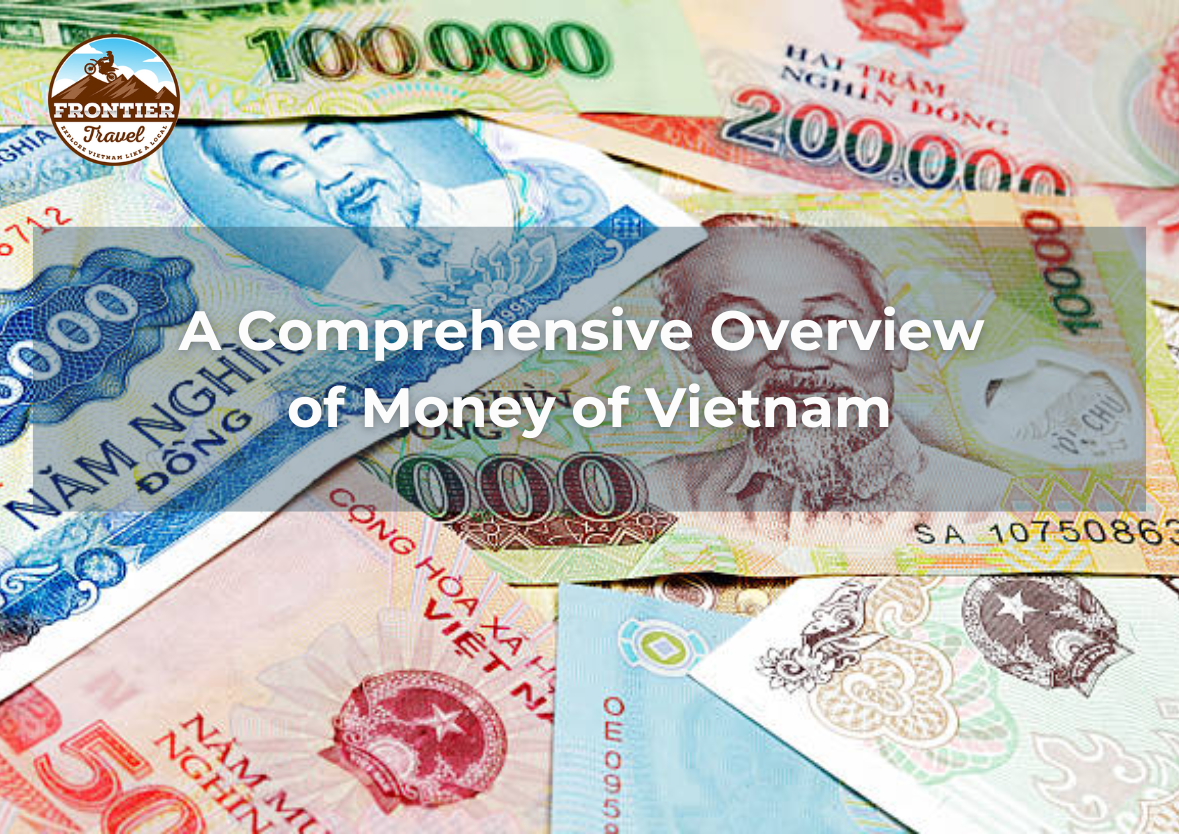
1. What Is The Currency In Vietnam?
The official currency in Vietnam is the Vietnamese Dong (VND). The Dong, abbreviated as VND, is available in coins and banknotes. The banknotes come in various denominations, each with distinct colors and images.
The money of Vietnam comes in both paper and polymer banknotes. There are no coins in circulation. Here's a breakdown of the denominations you'll encounter:
1.1 Polymer Banknotes
- 10,000 VND: This brown banknote depicts Vietnam’s largest oil production site, Vung Tau. It is equivalent to approximately 0.43 USD.
- 20,000 VND: Blue, it features the Chùa Cầu (Japanese Bridge) in Hội An. It is around 0.86 USD worth of note.
- 50,000 VND: Pink in hue, it shows the Phu Văn Lâu Pavilion. Its value is roughly 2.15 USD.
- 100,000 VND: Green and portraying the Temple of Literature, this note equals about 4.30 USD.
- 200,000 VND: Red and featuring the Hạ Long Bay, it is worth around 8.60 USD.
- 500,000 VND: The largest denomination, blue-green, and depicting President Hồ Chí Minh's birthplace, it is approximately 21.50 USD.
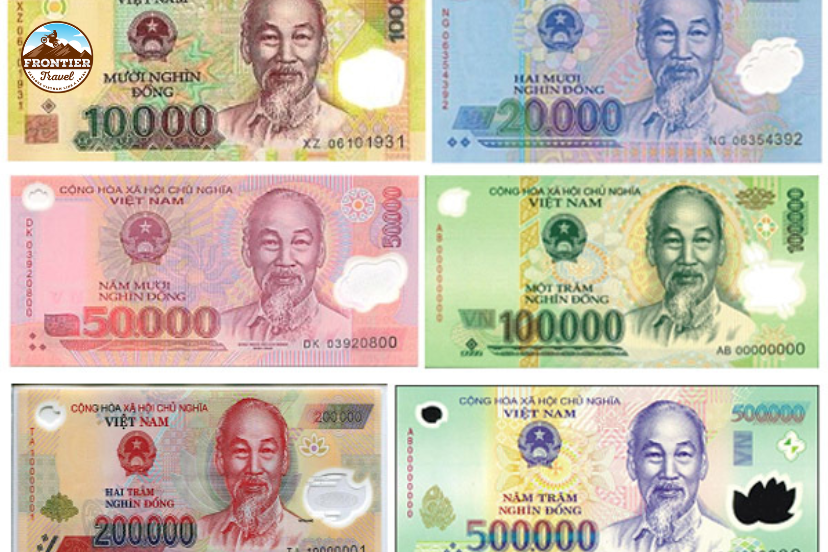
1.2 Cotton Banknotes
- 1,000 VND: The smallest denomination, depicted as logging in Tay Nguyen, is approximately 0.04 USD.
- 2,000 VND: Brown, featuring a textile weaving mill in Nam Dinh, is approximately 0.08 USD.
- 5,000 VND: Blue, representing the hydroelectric plant on the Dong Nai River, is approximately 0.21 USD.
Important Notes:
- Coins are no longer a common sight in everyday transactions in Vietnam due to their declining value in relation to the money of Vietnam.
- As of November 2023, the approximate exchange rate is 24,000 VND to 1 USD. It's advisable to confirm the most recent rates before departing.
- Exercise caution when handling 20,000 VND and 500,000 VND notes, as their similar blue hues can lead to confusion. Always verify the denomination before completing any transaction.
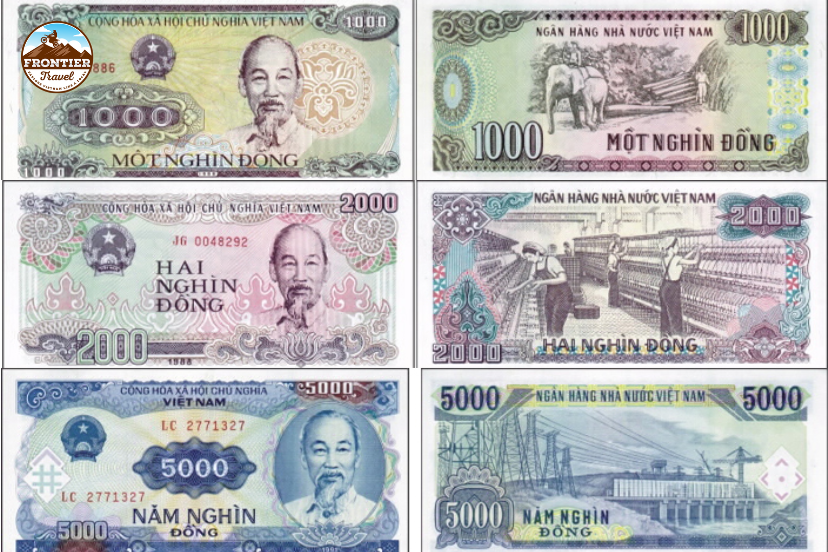
2. How To Withdrawal And Exchange Money Of Vietnam?
Withdrawing and exchanging money in Vietnam is straightforward, with several options available to travellers and residents.
2.1 Where to Exchange Money
There are various ways to exchange your money of Vietnam for Vietnamese đồng:
- Banks: Virtually all banks in Vietnam offer currency exchange services. It is recommended that a small amount be exchanged upon arrival at the airport to cover initial expenses like SIM cards, taxis, and meals. However, rates at airport exchanges are typically less favourable than city exchanges.
- Jewellers: Surprisingly, jewellers often provide better exchange rates and accept a wide range of currencies. This is also a custom within the community.
- Specialized Areas: In Hanoi, for instance, Ha Trung Street is renowned for its concentration of currency exchange services, situated near Ben Thanh Market in Saigon.
Tips for exchange: Before you exchange, use reliable sources like XE or the Vietcombank website to check the current exchange rate.
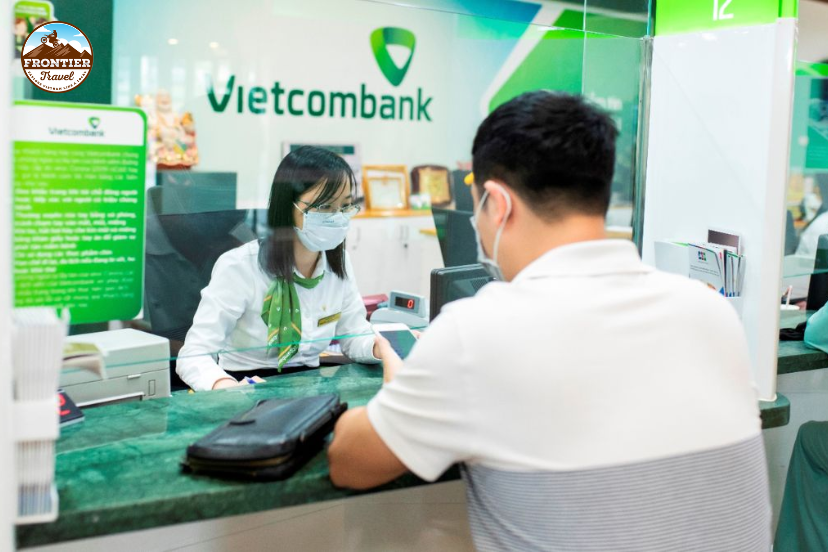
2.2 Where to Withdrawal Money
ATMs
ATMs are widely available throughout Vietnam, offering convenient access to your money of Vietnam. Most accept international cards such as Visa, MasterCard, and American Express. Be mindful of transaction fees, which can vary between banks. It’s advisable to use ATMs of reputable banks like Vietcombank, BIDV, or Agribank.
Banks charge a withdrawal fee from 30,000 VND to 50,000 VND per transaction. Some ATMs may charge higher fees, up to 100,000 VND.
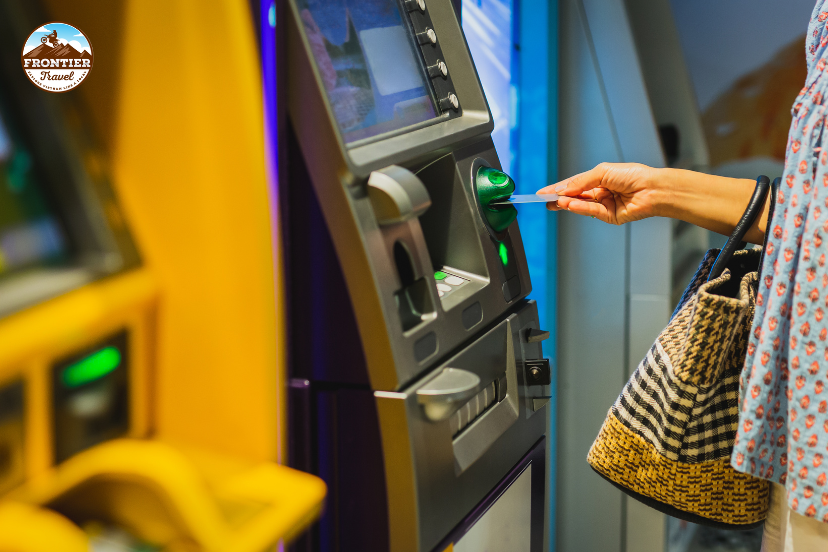
Bank Transactions
When exchanging currency in Vietnam, conducting transactions inside banks guarantees you will receive new, authentic banknotes. Banks typically offer competitive rates, but be prepared to show your passport for verification. Operating hours are usually from Monday to Friday, 8 AM to 5 PM, with some branches in larger cities open on Saturday mornings.
Payment Tips
- While credit cards are accepted in some establishments, cash is still the preferred payment method in Vietnam, especially in smaller towns and local markets.
- While euros are accepted in some places, the US dollar is more widely recognized and accepted, making it a good option for exchanging money.
- It's customary to bargain in Vietnam, particularly in markets and smaller shops.
3. FAQ About Money Of Vietnam?
Understanding the currency system in Vietnam is key to a smooth and enjoyable trip. Here are answers to frequently asked questions about money of Vietnam:
3.1 Is It Better To Exchange Money In Vietnam Or Before Travelling?
Generally, it's better to exchange a small amount before you arrive for immediate expenses and then exchange the rest in Vietnam to get a better rate.
3.2 Where Can I Exchange Currency In Vietnam?
When it comes to exchanging your currency in Vietnam, you have a variety of options to choose from:
- Banks: Offer reliable exchange services with fair rates.
- Currency Exchange Bureaus: Can be found in tourist areas but compare rates.
- Airports: Practical, yet frequently less affordable prices.
- Hotels: Some offer exchange services, but rates may not be the best.
3.3 Are Credit Cards Widely Accepted In Vietnam?
Credit cards are widely accepted in major cities, especially in hotels, large restaurants, and shops. In rural areas and smaller companies, cash is preferred. Always carry some VND for small purchases and emergencies.
3.4 How Much Cash Should I Bring To Vietnam?
The amount of cash to bring depends entirely on your travel plans and spending habits. It’s advisable to bring enough VND to cover the first few days and withdraw additional money of Vietnam (VND) as needed.
ATMs are readily available, so you can access more cash throughout your trip. A reasonable daily budget might be around 500,000 to 1,000,000 VND (approximately 21.50 to 43 USD).
3.5 How To Avoid Money Scams In Vietnam?
Exercise caution and be mindful of the following to avoid money scams in Vietnam:
- Overly friendly locals: May try to steer you towards overpriced services or shops.
- Fake taxis: Use reputable companies or ride-hailing apps.
- Double-checking bills: Ensure you're being appropriately charged, especially in markets.
- Use reputable exchange services: Stick to banks, reputable exchange bureaus, and hotels for currency exchange.
- Be cautious with street vendors: Avoid exchanging money with street vendors or unofficial money changers, as you might receive counterfeit notes or unfavorable rates.
- Check your change: Always count your change carefully, especially in busy markets and tourist areas. Familiarize yourself with the appearance of the different denominations to avoid being shortchanged.
In conclusion, this comprehensive overview of money in Vietnam equips travelers with essential knowledge for navigating financial transactions effectively. Whether exchanging currency at banks or leveraging ATMs across urban landscapes, understanding these nuances ensures a seamless experience.
Consider consulting Frontier Travel Vietnam to explore further Vietnam's rich cultural tapestry and practical travel tips. Prepare wisely and enjoy your journey through this vibrant Southeast Asian gem.






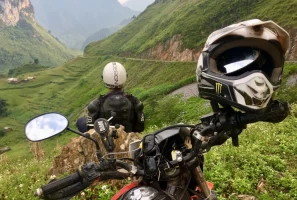


.png)